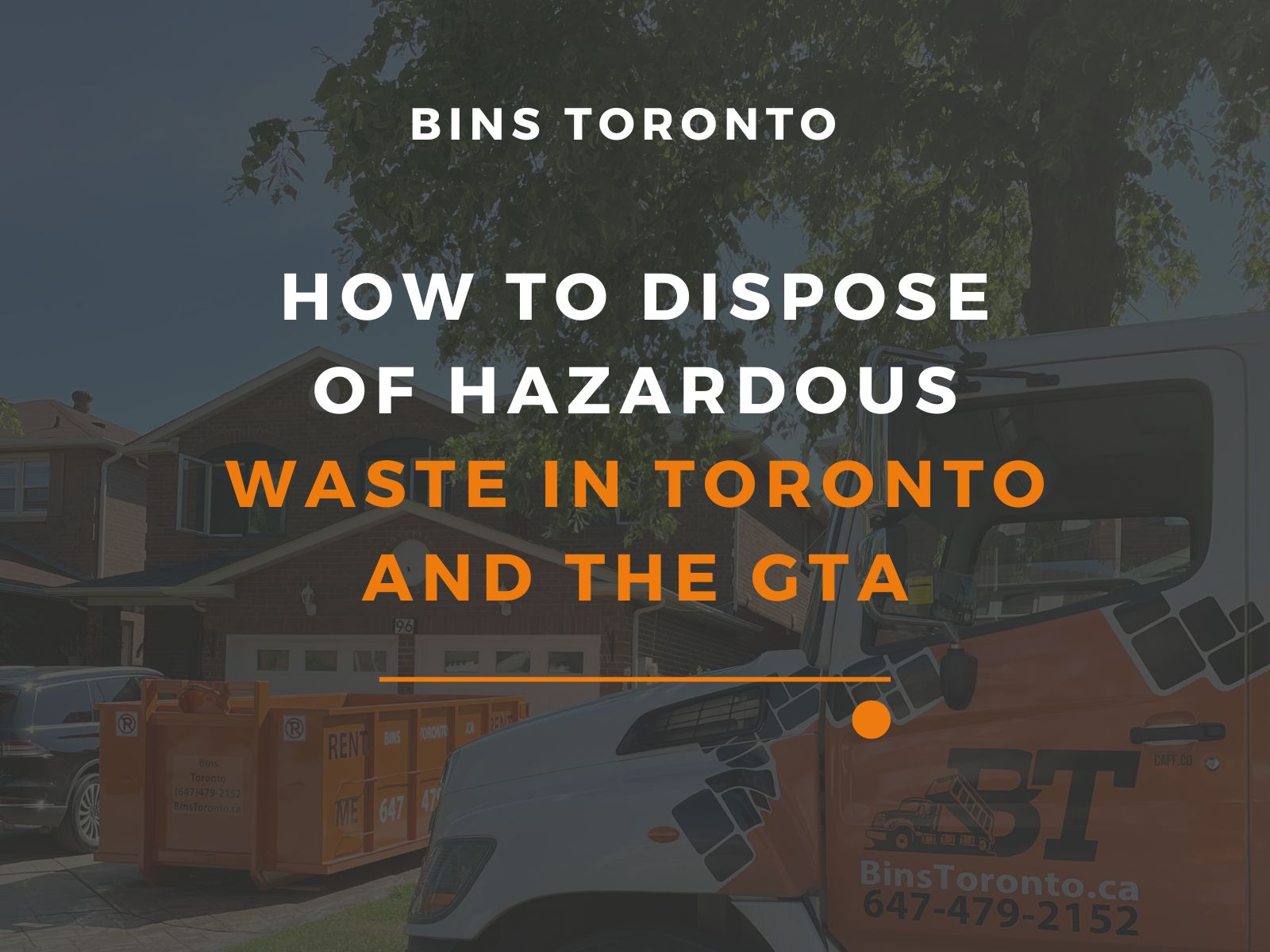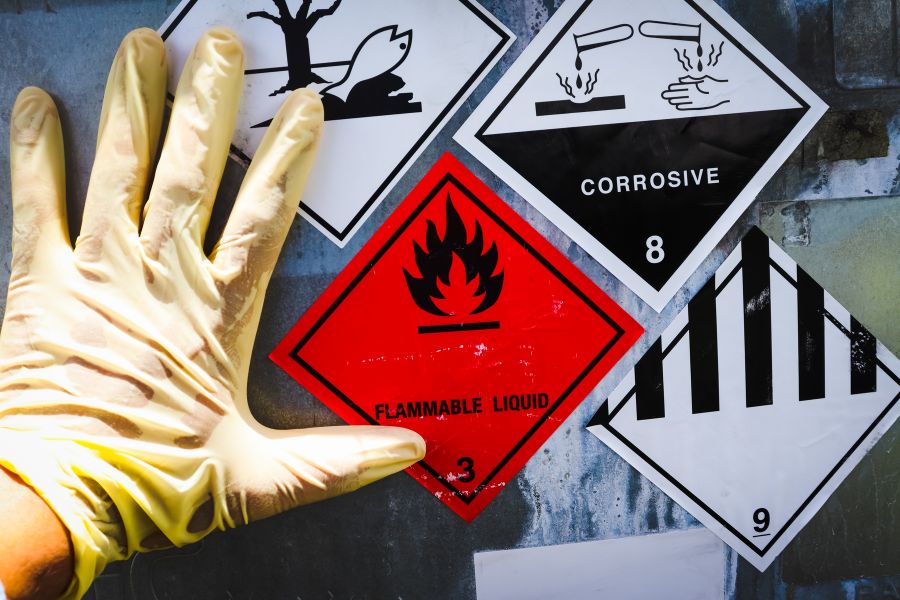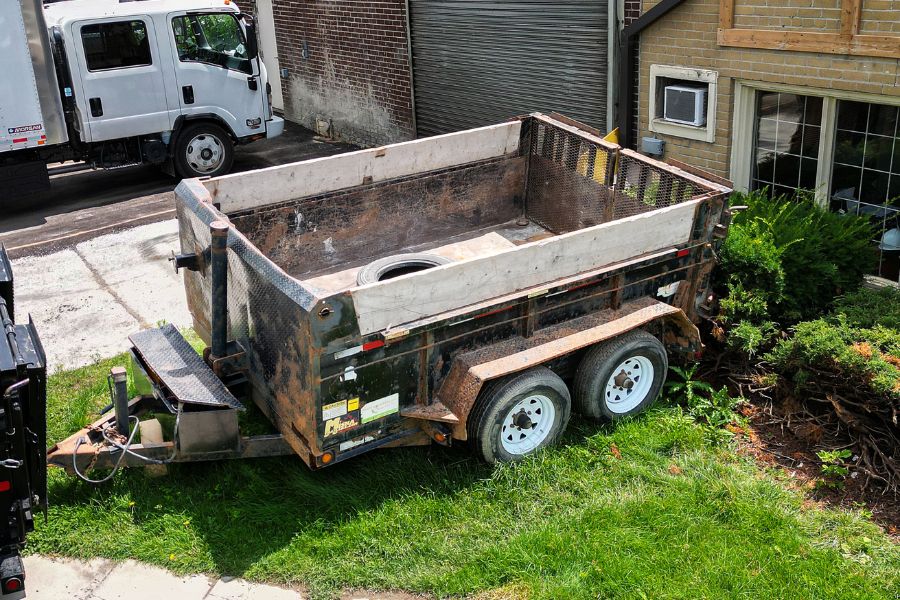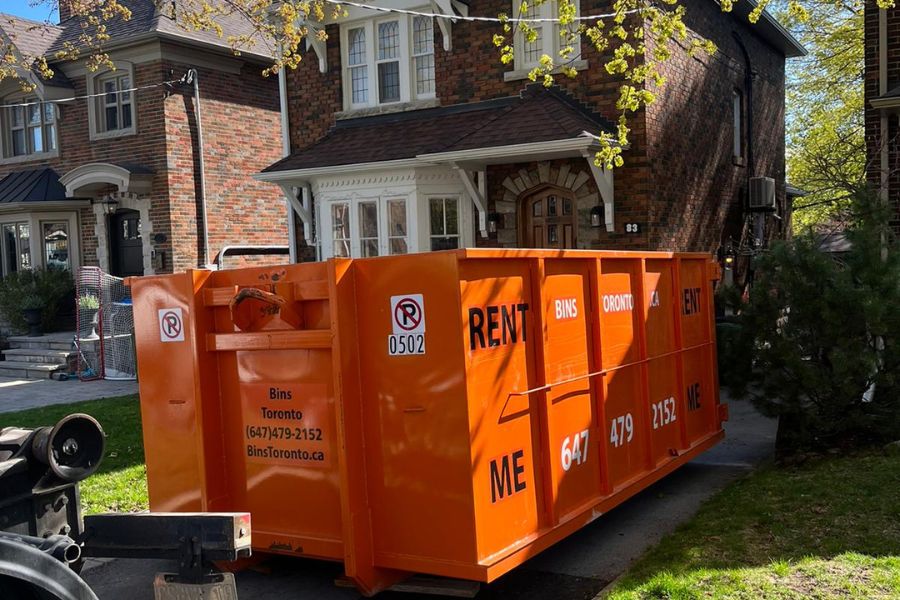

Premier Bin rental Service in Toronto and the GTA

August 15, 2025
Hazardous waste is part of everyday life in homes and construction sites across Toronto and the GTA. You generate it when you paint a room, change your car’s oil, or renovate your kitchen. If you do not handle it correctly, you risk fines, environmental damage, and personal harm. We at ALMAR Demolition see improper disposal every day. People dump paint down storm drains. They throw batteries in the blue bin. They leave old electronics on the curb. These actions are illegal and dangerous.
This guide gives you every bit of information you need to know before thinking about disposing of hazardous waste. You will get to know about what counts as hazardous waste. And how to dispose of them correctly, and where to dispose of different materials as well. You need all the addresses, hours, and rules from Toronto, Peel, York Region, and Hamilton. You will learn how to store and transport waste safely. Let’s go through each step and understand what goes into renting a dumpster and what must never go in one. This is what you need to stay compliant and safe when you need to follow all local guidelines for disposing of waste.
Hazardous waste is any material that can harm people or the environment. It may be toxic, flammable, corrosive, or reactive. Common types include chemicals, solvents, batteries, and electronic devices. These items do not break down. They can leak into soil and water. They can cause fires or chemical burns. You must not treat them like regular trash.
The City of Toronto defines hazardous waste under its Household Hazardous Waste program. The Region of Peel, York Region, and Hamilton have similar rules. These programs cover materials that cannot go in your garbage, recycling, or organics bins. They also cannot go in rental dumpsters unless explicitly allowed.

The City of Toronto operates four permanent Household Hazardous Waste depots. They are open to residents only. You must show proof of address. No fee is charged.
Dufferin Aggregates East is at 135 Dufferin St. It is open Monday to Friday 9 AM to 5 PM. Saturday 8 AM to 4 PM. Closed Sunday.
Eastern Avenue HHW Depot is at 156 Eastern Ave. Hours are the same.
Islington Yard is at 2900 Islington Ave. Same schedule.
McCowan Road Yard is at 1300 McCowan Rd. Same hours.
You can bring paint, solvents, pesticides, cleaning chemicals, motor oil, antifreeze, car batteries, propane tanks, and fluorescent bulbs. You can also drop off e waste in small quantities.
Do not bring asbestos, explosives, medical waste, or tires over two per visit.
Peel Region services Mississauga, Brampton, and Caledon. Residents can use the Community Environment Days. These occur on the first Saturday of each month from April to November. Sites are at 3900 Derry Rd E in Mississauga and 1616 Steeles Ave W in Brampton. Hours are 9 AM to 4 PM.
Peel also has a permanent HHW depot at 6455 Financial Dr in Mississauga. It is open Monday to Friday, 7 AM to 4 PM. Saturday, 8 AM to 3 PM. Residents enter free.
Accepted items include all standard HHW, e-waste, automotive fluids, and up to four tires.
York Region has three disposal sites. The Central Disposal Site is at 3650 Major Mackenzie Dr W in Vaughan. South Disposal Site is at 6555 14th Ave E in Markham. North Disposal Site is at 1005 1st Line in Aurora. All are open Monday to Friday, 7 AM to 6 PM. Saturday and Sunday, 7 AM to 5 PM. York Region residents only. Free entry.
You can drop off paint, solvents, pesticides, e-waste, motor oil, antifreeze, car batteries, and propane tanks.

Hamilton’s HHW depot is at 42 Barton St E. It is open Wednesday to Friday, 10 AM to 6 PM. Saturday and Sunday, 8 AM to 4 PM. Closed Monday and Tuesday. Hamilton residents only. Free.
Accepted materials include paint, solvents, pesticides, automotive fluids, propane tanks, and fire extinguishers.
Do not bring tires, mattresses, or pharmaceuticals.
E-waste must go to designated drop-off points. Return It Electronics runs the provincial program. You can return computers, monitors, TVs, and small appliances at any Best Buy store in the GTA. Home Depot, RONA, and Staples also accept e-waste. No fee is charged.
Batteries are handled by Call2Recycle. Drop them at Home Depot, RONA, Staples, or Lowe’s. No charge.
Motor oil and filters can go to Canadian Tire. Most locations have a collection bin. Free.
Unused or expired medications go to any pharmacy. Ontario’s Safe Rx program accepts them. Sharps must be in a sealed container. Return them to a hospital or pharmacy.
Asbestos and lead-based paint are not household waste. You cannot take them to HHW depots. You must hire a licensed contractor. They will package the material in sealed plastic. They will transport it to a licensed landfill. ALMAR Demolition does not accept asbestos in rental bins. It is illegal and unsafe.
Waste Type |
Can It Go in a Rental Dumpster |
Proper Disposal Method |
Locations |
Notes |
|---|---|---|---|---|
| Oil-based paint | No | HHW depot | Toronto, Peel, York, Hamilton | Flammable |
| Latex paint | Only if dried | Dry and dispose of the garbage | At home | Mix with kitty litter |
| Solvents and thinners | No | HHW depot | All regions | Flammable |
| Pesticides and herbicides | No | HHW depot | All regions | Toxic |
| Cleaning chemicals | No | HHW depot | All regions | Corrosive |
| Motor oil and filters | No | HHW depot or Canadian Tire | All regions | Recyclable |
| Antifreeze | No | HHW depot | All regions | Toxic to animals |
| Car batteries | No | HHW depot or auto shop | All regions | Lead acid |
| Lithium-ion batteries | No | Call2Recycle drop point | Home Depot, Staples | Fire risk |
| E waste | No | Return It Electronics | Best Buy, Home Depot | Contains heavy metals |
| Fluorescent bulbs | No | HHW depot or Home Depot | All regions | Contains mercury |
| Propane tanks (1 lb) | No | HHW depot | All regions | Pressurized |
| Asbestos | No | Licensed abatement contractor | Special facilities | Not for HHW depots |
| Lead-based paint | No | Licensed contractor | Licensed sites | Do not sand |
| Medications | No | Pharmacy | Any pharmacy | Safe Rx program |
| Sharps | No | Hospital or pharmacy | Designated sites | Use puncture-proof container |

If you are renovating, plan ahead. Set up a staging area for waste. Label containers clearly. Schedule drop-offs during your project. Do not wait until the end.
Toronto generates over 800,000 tonnes of waste annually. A portion is hazardous. When people dump it illegally, it ends up in waterways. Motor oil from one car can pollute 1 million litres of water. Mercury from a single thermometer can contaminate a small lake.
The city fines residents and contractors for improper disposal. Fines for illegal dumping start at $500. They can reach $5,000 for repeat offenses. If you rent a dumpster and fill it with hazardous waste, you are liable.
Proper disposal protects your community. It keeps toxins out of parks, rivers, and playgrounds. It reduces the risk of fires at transfer stations. When you use a junk removal service, you must know what happens to your waste. Not all companies sort materials correctly. Some dump everything in a landfill. Others claim to recycle but do not.
We at ALMAR Demolition are professional experts in junk removal services. Junk removal is not just about hauling. It is about responsibility. Old furniture may contain flame retardants. Mattresses often go to landfills because few places break them down. Electronics have toxic metals. Paint cans may still be wet. A professional service will not take these items and dump them. We will route them properly.
You are responsible for identifying hazardous materials before disposal. Items like chemicals, batteries, paints, solvents, and electronic waste can be flammable, toxic, or corrosive. Do not assume they can go in a dumpster. Check labels or consult a Material Safety Data Sheet if available. Especially if you are a contractor, train your crew. Make sure they know what can and cannot go in the bin. Post a list on the site.
ALMAR Demolition follows strict protocols. We separate waste at the source. Our professional disposal team also recycles when we can. We dispose of hazardous materials through approved channels. We do not cut corners. You can do the same. Dispose of hazardous waste correctly. Use the sites listed. Follow the rules. Protect your property, your workers, and your city.